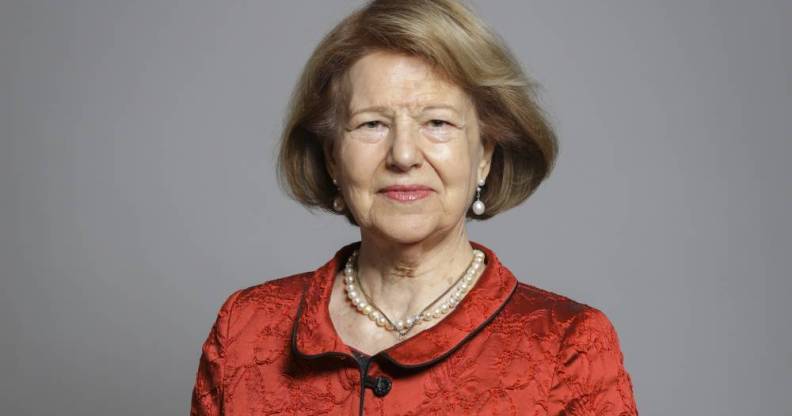Baroness Nicholson forced to back down on banning trans people from hospital wards

Baroness Nicholson. (UK Parliament, cropped. https://creativecommons.org/licenses/by/3.0/)
Baroness Emma Harriet Nicholson’s plan to block trans people from the correct hospital wards was beautifully emphatically shut down in the House of Lords.
In the early hours of the morning on Thursday (17 March), Baroness Nicholson proposed an amendment to the controversial Health and Care Bill, which aims to reorganise the NHS to make it more similar to a US health system. The bill passed through the House of Commons last year and is currently on its third reading in the House of Lords.
Nicholson wanted to add an amendment which would revoke NHS guidance on placing transgender patients on hospital wards which align with their gender.
Current NHS guidance on delivering same-sex accommodation, produced in 2019, includes “annexe B”, which sets out provisions for trans patients. It asserts that trans people “should be accommodated according to their presentation: the way they dress, and the name and pronouns they currently use”, and that this is not dependent on surgery, medical transition or having a Gender Recognition Certificate (GRC).
But Nicholson told the House of Lords that the guidance was not in line with the Equality Act 2010, and that it “gives priority to trans people over women”, adding: “Self-ID, which is at the heart of annexe B, has deliberately been pushed through, almost surreptitiously.”
In response, Lord Terence Etherton expertly set the record straight.
He said: “I rise to oppose this amendment… The question is whether annexe B to the September 2019 guidance is consistent with the existing law.
“I say that it is entirely appropriate and consistent with the anti-discrimination law in the Equality Act.”
There's lots of misinformation about the Equality Act and the protected characteristic of gender reassignment. In the early hours of this morning the former Master of the Rolls, Lord Etherton, gave a powerful legal reminder in the House of Lords: pic.twitter.com/hh6fNyeHQg
— Neil (@neilLGBT) March 17, 2022
Lord Etherton explained that the Equality Act’s protected characteristic of “gender reassignment” includes “where a person is proposing to undergo, or is undergoing, a process, or part of a process, for the purpose of reassignment by changing physiological or other attributes of sex”.
“This means that a person may have the protected characteristic without having undergone full surgical reassignment, let alone having a Gender Recognition Certificate,” he said.
“It will be sufficient, for example, if they had adopted attributes of a different sex, such as name, dress or hair, in their intended process of transition.”
Etherton said that while the Equality Act does make exemptions for barring trans folk from single-sex spaces, this decision must be “a proportionate means of achieving a legitimate aim”.
"It is not a legitimate aim that some people feel uncomfortable sharing accommodation and facilities with trans people of the opposite birth sex. That would make a nonsense of having the statutory protected characteristic in the first place." pic.twitter.com/Wx6pzZbhYl— Neil (@neilLGBT) March 17, 2022
“It is not a legitimate aim that some people feel uncomfortable sharing accommodation and facilities with trans people of the opposite birth sex,” he explained.
“That would make a nonsense of having the statutory protected characteristic in the first place.”
Baroness Nicholson’s amendment left Stonewall founder Lord Cashman ‘deeply ashamed’ of the House of Lords
Lord Etherton was backed up by multiple members of the House of Lords, including Lord Michael Cashman, a long-time LGBT+ rights activist and co-founder of Stonewall.
Cashman said: “I could talk about my concerns about what this amendment would cause for trans women and trans men seeking treatment and care in the NHS. I will leave that to your Lordships’ imagination.
“However, I have to say, hearing the way in which trans women, trans men, trans families and trans teenagers have been represented by some in this House tonight has left me deeply ashamed.
“It is part of a continuing narrative to grab something of a minority and use it to represent the entire minority. It was done to people like me when we were arguing with the noble Lord, Lord Blencathra, when he was in Home Office, for an equal age of consent.”
The debate on Baroness Nicholson’s amendment lasted for over an hour, but finally, she was forced to withdraw it.
In August, 2021, health secretary Sajid Javid ordered a review of the NHS guidance on admitting trans patients onto single-sex hospital wards after a deeply misinformed and transphobic report in The Telegraph about “trans sex offenders”.
A spokesperson for Mermaids, a charity that supports young trans people and their families, said at the time: “Sexualising trans adults and young people, implying they are a threat, is harmful to those simply trying to access NHS care with dignity and safety, free from prejudice.”
The review is ongoing.

